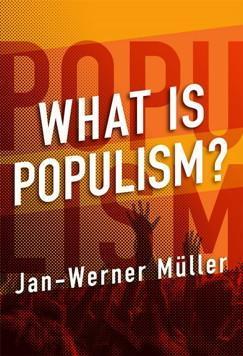What is populism?
William Armstrong - william.armstrong@hdn.com.tr

Pro-Brexit voters celebrate in London after the UK's vote to leave the European Union in June 2016. AFP photo
‘What Is Populism?’ by Jan-Werner Müller (University of Pennsylvania Press, 136 pages, $20)With the election of Donald Trump in the U.S. and the Brexit vote in U.K., 2016 looks set to be remembered as a year of populist revolt. In 2017 we could see a deepening of the pattern in Europe, where critical elections will be held in France, Germany and the Netherlands. If things go badly for the forces of the status quo, next year could see an acceleration of the collapse of the European Union and an end to the post-Cold War liberal order. In a dangerous world, many people are turning to strongmen, but those strongmen will only make it more dangerous.
 Plenty of ink has been spilled on the populist phenomenon. John Judis’ thoughtful recent book “The Populist Explosion” argued that populism, in all its forms, always posits a simplistic opposition between “the people” and “the elite.” But he also distinguished between left-wing and right-wing populism: Left-wing populists like Bernie Sanders accuse the establishment of betraying the people; right-wing populists like Donald Trump or France’s Marine Le Pen also accuse the establishment of coddling a third group (Muslims, Latinos, Jews, migrants, African Americans, etc.). Ultimately Judis strikes a philosophical note, arguing that while populism is often unpleasant, it has historically acted as a kind of natural corrective, a democratic warning that the status quo is unsustainable and a change of some sort must come.
Plenty of ink has been spilled on the populist phenomenon. John Judis’ thoughtful recent book “The Populist Explosion” argued that populism, in all its forms, always posits a simplistic opposition between “the people” and “the elite.” But he also distinguished between left-wing and right-wing populism: Left-wing populists like Bernie Sanders accuse the establishment of betraying the people; right-wing populists like Donald Trump or France’s Marine Le Pen also accuse the establishment of coddling a third group (Muslims, Latinos, Jews, migrants, African Americans, etc.). Ultimately Judis strikes a philosophical note, arguing that while populism is often unpleasant, it has historically acted as a kind of natural corrective, a democratic warning that the status quo is unsustainable and a change of some sort must come.“What is Populism?” by Jan-Werner Müller, a professor of politics at Princeton University, takes a darker view. Populism, he writes, is “a permanent shadow of modern representative democracy … a degraded form of politics that is blatantly antidemocratic.” It is essentially “a way of perceiving the political world that sets a morally pure and fully unified – but ultimately fictional – people against elites who are deemed corrupt or in some other way morally inferior.” In this process, all intermediary institutions, (civil society, an independent judiciary, the media), are dismissed as illegitimate.
In addition to being anti-elitist, Müller writes, “populists are always antipluralist.” They claim that they, and they alone, authentically represent the “real” or “true” people, always defined as righteous and morally pure. “This is the core claim of populism: Only some of the people are really the people,” writes Müller. “This claim to exclusive representation [is] an exclusionary form of identity politics.” When running for office populists dismiss their political competitors as part of an immoral, corrupt elite; when ruling they refuse to recognize any opposition as legitimate.
That is why populism is a threat to democracy. “Democracy requires pluralism and the recognition that we need to find fair terms of living together as free, equal, but also irreducibly diverse citizens. The idea of the single, homogeneous, authentic people is a fantasy,” writes Müller. “And it’s a dangerous fantasy, because populists do not just thrive on conflict and encourage polarization; they also treat their political opponents as ‘enemies of the people’ and seek to exclude them altogether.” Populism is thus “a degraded form of democracy that promises to make good on democracy’s highest ideals (‘Let the people rule!’)”
Müller’s book is full of examples from Turkey, where President Recep Tayyip Erdoğan and the Justice and Development Party (AKP) exhibit many signs of demagogic right-wing populist nationalism. Turkey is indeed a good warning about what can happen once populism enters office. The conventional wisdom is that populist parties are primarily protest parties, and their simplistic ideas are bound to fail once confronted by political reality. This, Müller writes, is a “comforting illusion.” Populists can certainly rule as populists. Once in office they “continue to polarize and prepare the people for nothing less than what is conjured up as a kind of apocalyptic confrontation,” continuing to rail against “the system” by imagining numerous shady enemies. The dismissal of rivals as illegitimate, inauthentic “non-people” becomes far more dangerous once populists are in power.
Populist governance, Müller argues, exhibits three particular features: “Attempts to hijack the state apparatus, corruption and ‘mass clientelism’ (trading material benefits or bureaucratic favors for political support by citizens who become the populists’ ‘clients’), and efforts systematically to suppress civil society.” These are all clearly in evidence in Turkey. Revelations of corruption also rarely hurt populist leaders. “In the eyes of their followers, ‘they’re doing it for us,’ the one authentic people,” writes Müller. “State colonization, mass clientelism, and discriminatory legalism [are] practiced openly and, one might suspect, with a clean moral conscience,” justified as “the will of the people.”
In some senses, Turkish President Erdoğan’s journey has been in reverse. He first entered office as prime minister in 2003 pledging a moderate path in line with the existing system. In the years since, he has gradually taken an irreversible course down the warpath. A man who has been in a position of unimpeachable power for 14 years now sustains his popularity by finding an endless supply of enemies to blame for failures, ramping up polarization and blasting his opponents as pawns of dark international forces. The simplistic idea of “pious, pure citizens” against a “secular elite” is in many ways the Turkish version of the tendentious “authentic real people” versus the “remote liberal elite” formula we see in much of the West today.
Like Judis’ “The Populist Explosion,” Müller’s book fails to reckon with the influence of new technology in fueling populism. The collapse of the traditional print and broadcast media as arbiters of public opinion and the rise of alternative social media more closely catering to users’ prejudices has fanned the populist flames more than Müller recognizes. He acknowledges that populists “always want to cut out the middleman” to make direct emotional appeals to the people without mediation. But he does not go into enough detail about how new media traps people in tighter, more polarized information silos, raising the political temperature and fostering an atmosphere where facts are dismissed in favor of emotion.
Müller’s suggested responses to the populist threat are also disappointingly slight. He rightly describes as misleading the idea that “liberal democracy involves a balance where we can choose to have a little bit more liberalism or a little bit more democracy.” He argues that “the notion that we move closer to democracy by pitting a ‘silent majority,’ which supposedly is being ignored by elites, against elected politicians is not just an illusion; it is a politically pernicious thought.” But his suggestions of the way forward are wishy-washy, amounting to little more than exhorting defenders of liberal democracy to “think harder” about what current failures of representation might be.
Still, the sharpness of the diagnosis outlined in “What is Populism?” is bracing enough. It is written with elegance and punch, and should be read by anyone concerned or enthused by the shaking of the political establishment across the world.
* Follow the Turkey Book Talk podcast via Twitter, iTunes, Stitcher, Podbean, Acast, or Facebook.










